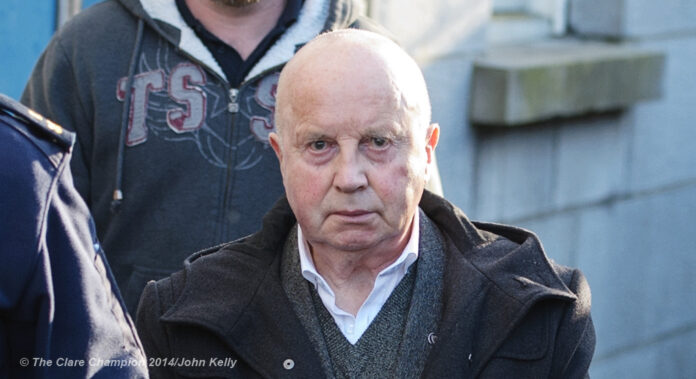A former primary school principal has lost an appeal against conviction for indecently assaulting 11 women while they were pupils of his in West Clare.
Patrick Barry (80), of Well Road, Kilkee, had pleaded not guilty to 67 charges of indecently assaulting 11 women on dates between 1964 and 1985 while they attended Moyasta National School as pupils.
Barry was found guilty by a jury of 59 counts of indecent assault and not guilty of the remaining eight counts by direction of the trial judge Judge Gerald Keyes.
He was sentenced to 11 years imprisonment with the final five suspended by Judge Keyes at Ennis Circuit Criminal Court on November 19 2014.
Speaking today (MONDAY) on behalf of the Court of Appeal, Mr Justice Garrett Sheehan said the three judge court was “unable to hold” with Barry on any of his 12 grounds of appeal and accordingly his appeal
against conviction was dismissed.
Mr Justice Sheehan said Barry had been a teacher in a small, mixed, two teacher school in rural County Clare 30 to 50 years ago.
Eleven of his female pupils claimed that when they were in fifth and sixth class they were indecently assaulted by him, the judge said.
Mr Justice Sheehan said Barry would sit down beside the girls at their desks and touch them indecently or would call them to the front of the class and make them stand between his legs while he was pressed against them.Sometimes, the judge said, he brought their hands up and down his legs and made some of them touch his genital area.
Apart from two particular complaints, all the offences occurred in the classroom in the presence of other pupils, Mr Justice Sheehan said.
Among Barry’s grounds of appeal was a submission relating to an alleged failure by the prosecution to sufficiently particularise counts on the indictment.
Each of the 67 counts on the indictment under the heading ‘Particulars of Offence’ had alleged that Barry, within a time band of four months at an identified school, indecently assaulted a named female complainant.
Mr Justice Sheehan said at one point during the trial, the prosecution offered to amend the indictment by further particularising counts, but explained that this could lead to an indictment containing “up to 300 counts”.
“Counsel for the defence rightly refused to be drawn into negotiations on this matter and the matter was left there,” Mr Justice Sheehan said.
Counsel for Barry, Roderick O’Hanlon SC, further submitted that the trial judge erred in permitting the matter to go to the jury because of the delay.
There was no explanation for the delay, Mr O’Hanlon said. “Save for one complainant who indicated ‘who would have believed us’”, Mr Justice George Birmingham had remarked.
Mr O’Hanlon said the evidence would be radically different if it had been promptly dealt with. Instead his client was left in a position where allegations were non-specific as to dates and non-specific in relation to counts.
He further submitted that some of the complainants admitted to having received counselling in respect of what had “allegedly occurred” but the defence were refused access to notes of those sessions.
Counsel for the DPP, Anthony Sammon SC, had said the case was extensively canvassed, there had been a bail application by Barry earlier this year which was refused.
Mr Sammon described the approach taken by Barry as “if you can’t defend yourself on the facts, you attack the process”.
Mr Justice Sheehan, who sat with Mr Justice George Birmingham and Mr Justice Alan Mahon, put the matter of Barry’s appeal against sentence back to Friday next.
By Ruaidhrí Giblin
A native of Ennis, Colin McGann has been editor of The Clare Champion since August 2020. Former editor of The Clare People, he is a journalism and communications graduate of Dublin Institute of Technology.


